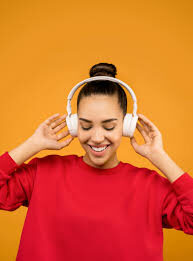 Music and Happiness: How to Boost Your Mood
Music and Happiness: How to Boost Your Mood
Did you know that listening to music can boost your mood, improve your mental and physical health, make you more productive, creative, and ultimately make you happier?
Last week, I had the privilege of leading a workshop for students and graduates of the Happiness Studies Academy covering just that!
We have all experienced the transformative power of music, whether it’s to soothe after a break-up, energize your workout, inspire awe and transcendence from its sheer beauty, or calm you down as you go to sleep. Music is a universal language that cuts across cultures to enhance feelings of joy, soothe our souls in times of need, motivate and energize us, and bring us together in communal experiences.
I personally have experienced the benefits of music since I grew up in a musical household and began playing the piano at age 5. I continue to play and perform music once a year at my annual pianoSonoma music festival and attend a lot of concerts. Music definitely contributes to my well-being and the quality of my life! However, until doing the research for my webinar, I did now know that science confirms the power of music to boost our moods! So let’s explore how and why listening to music can put you in a better mood.
Music and Positive Mood
What piece of music puts you in a happy mood?
I invite you to listen to Mais Que Nada by Sergio Mendes and Brasil ‘66. That’s how I started the webinar and everyone reported feeling energized, excited and all-round happy! How about you?
The research confirms that music can put us in a better mood and even boost our mental and physical health. In fact, a study conducted during COVID across 4 countries demonstrated that listening to music helped people feel better during an unprecedented life stressor.
Moreover, it turns out that music triggers the parts of the brain that are controlled and regulated by means of dopamine, the “feel good” neurotransmitter and hormone. This study went on to conclude that listening to music can directly evoke feelings and emotions pertaining to happiness.
In another study entitled “The transformative power of music: Insights into neuroplasticity, health, and disease”, scientists found that music can lead to transformative changes in the brain, fostering neuroplasticity and reshaping neural networks. The study also found that music positively affects cognition, memory, attention and learning, alleviates stress, anxiety and depression and helps promote physical health through pain management.
Happy Songs Playlists
Go back to your happy songs. There is actually some research on the topic from a Dutch neuroscientist, Dr. Jacob Jolij, the University of Groningen in the Netherlands. Dr. Jolij teamed up with a UK electronica band Alba to find out what were the characteristics of “happy” or “feel good” songs. He concluded that these songs:
- Tend to have a faster tempo of 140-150 beats per minute,
- Have cheerful lyrics that describe happy events or are even nonsensical, and
- Tend to be in a major key.
He then created a playlist of the 10 happiest songs from the past decade.
At the webinar, I played “Uptown Girl” by Billy Joel, which the webinar participants agreed made them “feel good”! Spotify has also created a playlist of 110 songs of the happiest songs based on Dr. Jolij’s formula.
You can also check out the happiest song booster playlist on Spotify that was created by a group of music therapists. That’s how I found Mais Que Nada!
And here is the playlist that I created for my webinar which left our participants feeling very happy!
Bottom Line:
Listening to music is a simple way to boost your mood and your health, so find your happy songs and see how they help you.
Next time: How music can boost your creativity!
